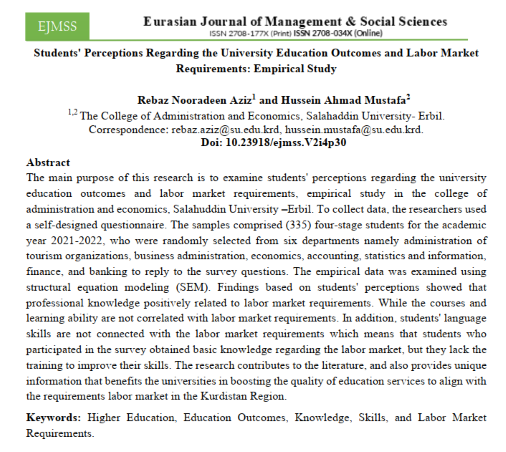مجلة محلية ذات (DOI) -
Students' Perceptions Regarding the University Education Outcomes and Labor Market Requirements: Empirical Study

مجلة محلية ذات (DOI) -
Students' Perceptions Regarding the University Education Outcomes and Labor Market Requirements: Empirical Study
In recent years, higher education systems, experienced a fundamental adjustment in terms of syllabuses and teaching methods, teaching patterns, and the development of modern discipline. To meet the labor market requirements, which demand attention to the quality of education services of the universities and educational institutions. Since, universities produce knowledge and science, besides abilities and skills developed through university education. Accordingly, universities are a vital source of promoting intellectual capital, culture, politics, economic, administrative, and leadership concepts; therefore, they play a significant role in all aspects of nations and societies' lives. However, higher education in the Kurdistan region and the rest of Iraq faces severe challenges regarding the increasing student levels; enrollment in the region is straining the limited resources of government or public universities, while, the number of private universities is increasing rapidly, despite a gap between university outputs and labor market requirements. The limited ability of KRG - to absorb the region's graduates as the rest of the country suffers from unemployment for their graduates. Besides, other factors may contribute to the KRI's inability, and it is the labor market to absorb university graduates, whether in the public or private sectors. In this regard, Nicolescu and Paun (2009), examined higher education and the labor market requirements.
The researchers mentioned that in recent years, the emphasis was on the link between higher education and the labor market worldwide. Thus, the primary purpose was about aligning education outputs, employability, and the labor market in general. It is worth revealing that there are still some differences between the world's countries, particularly between developed and developing countries; however, there are also numerous similarities. The topic of higher education outcomes and the labor market requirements was also examined over time by different researchers like (Schomburg, 2000, Paul and Murdoch, 2000; James, 2001; Raposo and Alves, 2005; Johnston and Elton, 2005). Although this research was conducted in the Kurdistan Region of Iraq, which is considered a developing country but in terms of higher education outcomes and labor market requirements, the region has vast similarities with developed countries. Even though it is assumed that universities should define a clear educational and national philosophy, they are consistent with the labor market requirements. In this research, the main research goal was to investigate students' perceptions of university education outcomes and labor market requirements. Therefore, it is an attempt to classify the knowledge, skills, and abilities that should be developed through university education, which may succeed in the labor markets, and consider other aspects beyond university education, particularly in Kurdistan Region. Also, evaluate how well the educational system in a public university in Kurdistan Region developed the labor market skills needed. As well as recognize teaching methods in university education that enables the development of labor market requirements. The research is expected to align the university education outcomes with labor market requirements by forming a model for research and assessing it. The research findings and recommendations are also expected to contribute to or benefit the universities in promoting the quality of education services to align with the requirements of the labor market in Kurdistan Region.
Hussein Ahmad Mustafa and Rebaz Nooradeen Aziz
The main purpose of this research is to examine students' perceptions regarding the university education outcomes and labor market requirements, empirical study in the college of administration and economics, Salahuddin University –Erbil. To collect data, the researchers used a self-designed questionnaire. The samples comprised (335) four-stage students for the academic year 2021-2022, who were randomly selected from six departments namely administration of tourism organizations, business administration, economics, accounting, statistics and information, finance, and banking to reply to the survey questions. The empirical data was examined using structural equation modeling (SEM). Findings based on students' perceptions showed that professional knowledge positively related to labor market requirements. While the courses and learning abilities are not correlated with labor market requirements. In addition, students' language skills are not connected with the labor market requirements which means that students who participated in the survey obtained basic knowledge regarding the labor market, but they lack the training to improve their skills. The research contributes to the literature and provides unique information that benefits the universities in boosting the quality of education services to align with the requirements of the labor market in the Kurdistan Region.
The results showed that from three components of the university education outcomes, professional knowledge only had a positive impact on labor market requirements. While the courses and learning ability did not impact the requirements of the labor market. In addition, students' language skills are not connected with the labor market requirements which means that students who participated in the survey obtained basic knowledge regarding the labor market, but they lack training to improve their skills.
The research contributes to education and provides unique information that benefits the universities in enhancing the education services quality to align with the requirements labor market in the Kurdistan Region.